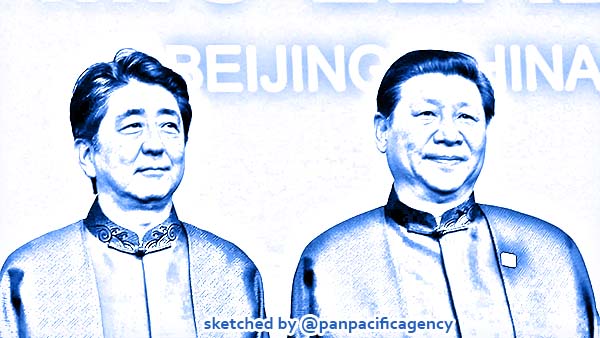[Analytics] Why Japan’s next leader should draw closer to China and South Korea instead of the US

Japanese Prime Minister Shinzo Abe, left, and Chinese President Xi Jinping attend an Asia-Pacific Economic Cooperation summit in Beijing in 2014 © Reuters. Sketched by the Pan Pacific Agency.
An unusually long period of political stability seems poised to end in Japan as Shinzo Abe steps down as prime minister. It could be a good thing if his successor chooses to strengthen relations with China and South Korea, and loosen ties with an erratic United States. Anthony Rowley specially for the South China Morning Post.
This is especially true where economic relations among the three East Asian powers are concerned because Abe, by virtue of his slavish attachment to President Donald Trump’s often destructive policies, has helped to polarise attitudes on regional cooperation.
How much and how quickly things change will depend on who is chosen on September 14 as the new president of the majority Liberal Democratic Party and prime minister.
To understand what a realignment of relationships under a new Japanese leader might mean, it is necessary to think about the economic potential of a strong Japan-China-South Korea alliance.
It is sometimes said that Japan is in Asia but not of Asia, just as Britain is in, but not of, Europe. Each likes to believe it has a “special relationship” with the US that allows it to act semi-independently of neighbouring continents.
But this is an illusion. Just as Britain risks being cut adrift from Europe and economic reality by Brexit, so Japan risks being stranded between an increasingly China-led Asia and a US not yet adjusted to its declining power.
Trump, whose tenure is highly uncertain after November, has not only damaged US-Asia trust by his impetuous actions but also set the stage for a change in intra-Asian economic relations that could rebound to the benefit of China and compel Japan to “change sides”.
The first victim of Trump’s “breakmanship” came on his first day in office in 2017 when he pulled the US out of the Trans Pacific Partnership that was part of predecessor Barack Obama’s pivot to Asia and a promised anchor for US economic relations in Asia.
Abe did his best to salvage the pact, which became the 11-nation Comprehensive and Progressive Agreement for Trans-Pacific Partnership (CPTPP) – and now even an adrift Britain wants to join it. But given that it lacks the world’s biggest economy, the alternative Regional Comprehensive Economic Partnership (RCEP) with China as its biggest member looks a more likely prospect.
Then, there is China’s Belt and Road Initiative, which is making strides across and beyond Asia with vast infrastructure projects that can help tie the region together. While the initiative does not have bottomless pockets, China’s rapid development of capital markets can help remedy the deficiency.
There is also the China-led Asian Infrastructure Investment Bank, which has attracted more than 100 nations into membership and is increasingly a rival to the World Bank and Asian Development Bank in terms of regional economic influence.
These are only some examples but they provide evidence of how Japan could find itself “on the wrong side” if it continues to follow the US in eschewing membership of such organisations or trying to back two horses, as in the case of the CPTPP and RCEP.
China’s economy has, meanwhile, shown remarkable resilience in the face of the Covid-19 pandemic – more than that of Japan, South Korea or the US – thus increasing its attractions as a market, not least for Japan.
The logic of strengthened economic ties between Japan and China is becoming more compelling as China’s economic presence becomes more visible and that of the US appears to wane. But political and cultural ties are more difficult, influenced not least by the relative attraction of the US. The fate of the latter depends partly on whether Trump remains in office, but regardless, the nature of the Japan-China relationship is destined to change.
In everything from technological innovation to financial system development (and many more areas in between), China is catching up with and even overtaking the US and thus Japan will need to join a partnership of equals in Asia rather than become the leading partner of the US.
This will require abandoning certain prejudices where China, and also South Korea, are learning to think big. It will require consummate economic as well as political diplomacy.
The new Japanese leader is likely to be Chief Cabinet Secretary Yoshihide Suga, for a caretaker period, and he has warned against a Japan that is too dependent upon China. After that, Shigeru Ishiba, who also seems wary of China, or Fumio Kishida, who appears more neutral, could take over.
There are, however, influential Liberal Democratic Party voices such as Secretary-General Toshihiro Nikai, who has strong connections in China. These voices are likely to be increasingly heard as Japan realises the need for a more balanced relationship with Beijing and Seoul.
Anthony Rowley is a veteran journalist specialising in Asian economic and financial affairs